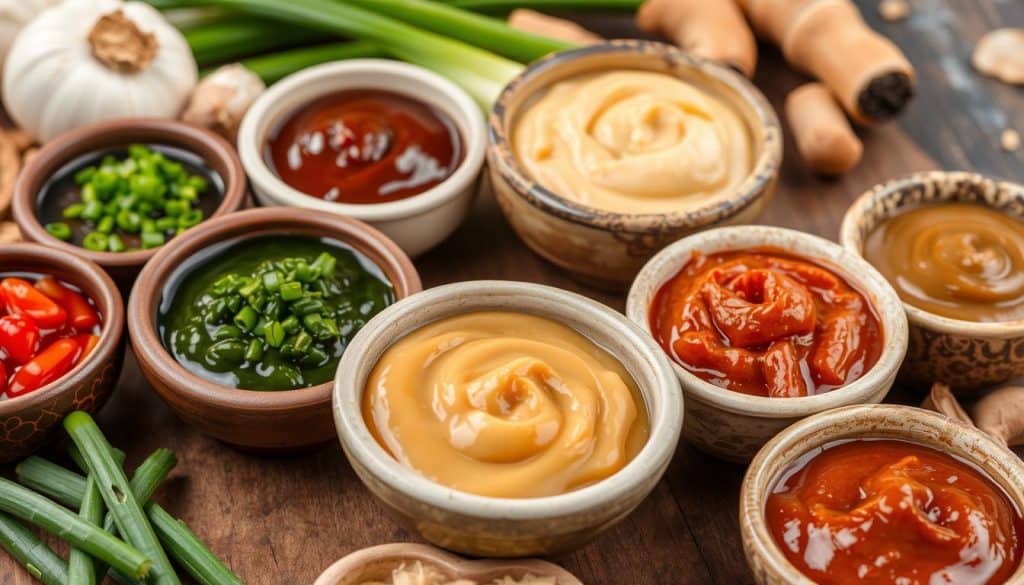Organic Miso for Immune Health: Top Picks Revealed
Did you know miso, a key part of Japanese food, has hundreds of types1? It’s not just for flavor; it’s full of nutrients that boost your immune system. Let’s explore organic miso and how it can change your health.
Organic miso is made from non-GMO soybeans, offering many benefits without pesticides. It’s not just a flavor booster; it’s great in soups, dressings, and even desserts1. We’ll look at the best organic miso for your immune health, showing why it’s essential in your kitchen.
Organic miso is packed with probiotics and nutrients, making it more than a tasty addition. It’s a key to better gut health and a stronger immune system. Let’s find the top picks to unlock miso’s full benefits.
Key Takeaways
- Organic miso is a fermented soybean paste rich in probiotics and nutrients
- It comes in hundreds of varieties, each offering unique flavors and benefits
- Miso is a versatile ingredient used in soups, dressings, and various dishes
- The fermentation process enhances miso’s nutritional value and immune-boosting properties
- Choosing organic miso ensures you avoid GMOs and pesticide residues
The Nutritional Powerhouse of Organic Miso
Organic miso is a fermented soybean paste full of essential nutrients. It’s a probiotic-rich condiment that offers many health benefits. Adding it to your diet can be very beneficial.
Essential Vitamins and Minerals
Organic miso is rich in vital nutrients. One ounce of miso paste has 12% of manganese, 10% of vitamin K, 6% of copper, and 5% of zinc2. These minerals are important for bone health, blood clotting, and the immune system.
Protein Content and Amino Acid Profile
Miso is a great plant-based protein source. It has 3 grams of protein per ounce and all essential amino acids, making it a complete protein2. This is good news for vegetarians and vegans who want to increase their protein.
Antioxidants and Phytonutrients
Organic miso is also full of antioxidants and phytonutrients. These help protect cells and may lower cancer risks. Eating miso regularly can lower liver and breast cancer risks by 50-54%2.
The fermentation process makes miso even more nutritious, creating over 400 health-promoting components3. Hatch Miso, for example, has isoflavones that may help with heart health and blood pressure4.
Even though miso is packed with nutrients, it’s missing vitamins A and C3. To balance your meal, add foods rich in vitamins like kale, sweet potatoes, or broccoli to your miso dishes.
Best Organic Miso Immune: Top Brands and Products
We’ve looked into organic miso to find the best for your immune health. This Japanese seasoning is full of umami flavor and health perks.
Miko Brand Additive-Free Miso Paste
Miko Brand Miso Miso is a top pick. Made in Nagasaki Japan , it’s available across the country.
Other Top-Rated Organic Miso Brands
While Miko Brand is a leader, other brands also offer great organic miso. Look for brands that use traditional fermentation. This method makes the miso taste stronger, darker, and healthier5.
Types of Miso: White, Red, Yellow, and Barley
Miso comes in different types, each with its own taste and cooking uses. White miso is milder and sweeter, fermented for three months. Red miso is bolder, and yellow miso is in between. Barley miso gives dishes a unique flavor6.
When picking miso, think about how it’s made and what’s in it. Organic miso powder, made from dried organic chickpea miso, is packed with minerals and vitamins. It’s dried gently to keep its health benefits7.
Japan has over 1,300 types of miso, offering many flavors and health benefits. Adding organic miso to your meals can help with digestion, boost your immune system, and enhance your cooking6.
Immune-Boosting Properties of Organic Miso
Organic miso is a fermented soybean paste that boosts your immune system. It’s a superfood with many health benefits. People have loved it for centuries.
The History and Cultural Significance of Miso
Miso comes from ancient Japan. It was seen as more than food, but as medicine. For over a thousand years, it’s been a key part of Asian food, loved for its taste and health benefits.
What is Miso and How is it Made?
Miso is made from soybeans, salt, and koji (a fungus). This makes a paste full of good stuff. It has vitamins, minerals, and enzymes. It’s also packed with amino acids and water8.
Factors to Consider When Choosing Organic Miso
Look for organic miso with long fermentation times for better taste and health. It has 18 amino acids, including the 8 our bodies can’t make8. These amino acids help with immunity, energy, and more8.
A tablespoon of miso has about 33.7 calories, with 1.02 grams of fat and 2.18 grams of protein9. It’s full of nutrients like calcium and B vitamins. Choosing organic miso supports sustainable farming and gives you a healthy product without pesticides or GMOs.
Understanding Miso: The Fermented Superfood
Miso is a traditional Japanese seasoning with a long history. It’s made from soybeans, sea salt, and rice koji10. For centuries, it has been prized in Asian cultures for its health benefits10.
The making of miso is a unique fermentation process. It’s done at a temperature of 25-30°C for the best results. Seawater salt is used to boost fermentation. High-quality soybeans are key to making top-notch miso11.
Miso is packed with nutrients. A tablespoon (15g) has 30 calories, 2.0g protein, 0.9g fat, and 3.5g carbs. It’s also rich in iron, zinc, and folate12. The fermentation makes it easier to digest and may strengthen the immune system12.
Studies show that eating miso regularly can be good for your health. It might lower cancer risk, help your heart, and strengthen bones in women in mid-life12. Miso’s phyto-oestrogens could also ease menopause symptoms12.
Miso comes in various types, each with its own taste and nutrients. These include rice, barley, soybean, and mixed miso. The mix of microbes in miso affects its flavor, texture, and nutritional value11.
As more people want fermented foods, miso’s popularity is on the rise. Its balanced nutrients and health benefits make it great for many diets11. Whether you love cooking or care about your health, trying miso can be a tasty and healthy journey.
Incorporating Organic Miso into Your Diet
Organic miso is a great way to add flavor to many dishes. It’s perfect for soups, dressings, marinades, and glazes. It’s also packed with nutrients like Vitamin B, Vitamin K, and minerals13.
To keep miso’s good bacteria alive, add it after cooking. A simple miso soup recipe has water, miso paste, seaweed, tofu, and green onions. You can also use miso as a dairy substitute in some recipes13.
Miso can help boost your immune system and aid in weight management. It’s low in calories but full of nutrients. This makes it a great choice for adding flavor without harming your health13. Eating miso regularly can also help with digestion issues like gas and bloating14.
“Miso’s unique umami flavor has inspired chefs and food enthusiasts to experiment with its use in various dishes, including desserts and fusion cuisine.”
Choosing organic miso supports companies that use traditional methods. This choice also helps the environment. It’s a smart pick for our health and the planet13.
The Fermentation Process and Its Benefits
Miso, a fermented soybean paste, has been a staple in Japanese cuisine for over 1,300 years. This probiotic-rich condiment undergoes a unique double fermentation process. It involves cooked beans, salt, and fermented grain1516.

How fermentation enhances miso’s nutritional value
The fermentation of miso boosts its nutritional profile. It’s full of essential amino acids, antioxidants, and minerals like zinc, copper, and manganese. It also has Vitamin K and B vitamins. The fermentation process creates beneficial bacteria and enzymes that help with digestion and nutrient absorption17.
Probiotics and gut health benefits
Miso is a probiotic-rich food that supports gut health. Its probiotic and prebiotic properties help maintain a healthy digestive system. Studies show that a healthy gut is linked to better mental health, cognitive function, and immune health1617.
Enzyme-rich compounds in fermented miso
Fermented miso is rich in enzymes that help detoxify the body and support overall health. These enzymes, along with the probiotic bacteria, help strengthen the immune system and aid in digestion1517.
The fermentation time of miso varies, from a few weeks to three years. Longer fermentation periods can increase antioxidants and may lower allergen levels for those with soy allergies1617.
Miso and Cardiovascular Health
Miso is getting attention for its heart health benefits. Even though it has a lot of sodium, studies show it might not harm the heart like other salty foods. A 2020 study from Japan found that eating fermented soy products like miso could lead to better health and longer life18.
The special mix in organic miso paste is key to its heart benefits. Each tablespoon (17 grams) is packed with nutrients. It has 2.2g of protein, 4.3g of carbs, and 0.9g of fiber18. These nutrients help keep the heart healthy and support a balanced diet.
Research on Japanese adults shows that eating miso can lower heart disease risk. The soy protein and peptides from fermentation in miso help protect the heart. A 2021 review in Frontiers in Nutrition found that miso doesn’t raise stomach cancer risk, even with its salt18.
Even though miso has heart benefits, it should be eaten in small amounts. The American Heart Association suggests no more than 2,300 mg of sodium daily18. A tablespoon of miso has about 634 mg of sodium, so watch your portion sizes.
Miso’s heart benefits go beyond its nutrients. The fermentation process makes millions of good bacteria, like lactobacilli and probiotics. These bacteria improve health, digestion, and immunity19. By supporting gut health, miso indirectly helps the heart, showing how our body systems are connected.
Organic Miso vs. Conventional Miso: What’s the Difference?
Choosing between organic miso paste and conventional miso involves several important factors. Let’s look at the differences. Organic miso might be better for your health and taste.
GMO Concerns and Pesticide Residues
Organic miso paste is made from non-GMO soybeans. It’s free from synthetic pesticides and fertilizers. This is key because many non-organic soybeans in the U.S. are genetically modified. Organic certification means the miso is made without harmful chemicals and meets strict quality standards.
Flavor and Quality Comparisons
Many people say organic miso tastes richer and more complex than conventional varieties. This might be because it lacks synthetic additives and uses traditional fermentation methods. Organic miso comes in types like rice, barley, soybean, and blended miso, each with its own flavor20.

Nutritional Benefits
Both organic and conventional miso are packed with nutrients. Organic miso might have a slight edge. A tablespoon of miso paste has about 34 calories, 2.2g of protein, and is full of vitamins and minerals18. Eating fermented soy products like miso may help with overall health and longevity18.
Miso is high in sodium, with 634mg per tablespoon. But research shows it might not increase the risk of stomach cancer. This could be because of the soy isoflavones it contains18. Still, people with soy allergies or gluten sensitivities should be careful and check labels18.
In summary, choosing organic miso paste means avoiding GMOs and pesticides. It also means getting a potentially better flavor and knowing it’s made under strict organic standards. Whether you’re making miso soup or trying new recipes, organic miso is a tasty and healthy option.
Delicious and Healthy Miso Recipes
Miso is a traditional Japanese seasoning that adds umami flavor to dishes. It’s versatile and nutritious. Let’s explore some tasty and healthy miso recipes.
Miso soup is a classic dish. It’s made with miso paste, water, seaweed, tofu, and green onions. There are three main types of miso: yellow, white, and red. Each type has a unique flavor21.
Red miso is fermented the longest, giving it a rich taste. White miso is lighter and milder21.
Try this 10-minute, 1-pot miso soup recipe for a boost to your immune system:22
- 4 tablespoons white miso paste
- 6 cups water
- 1 cup chopped spinach
- 1/2 cup diced tofu
- 2 tablespoons minced ginger
- 1 minced garlic clove
- 1/4 cup chopped green onions
This soup is great for 4-6 people and is full of nutrients22. Ginger and garlic help boost your immune system. Seaweed adds minerals like magnesium and iodine22.
For a heartier soup, try this mushroom miso soup:
- 1 lb oyster mushrooms (or white mushrooms)
- 3 cups fresh spinach
- 3 tablespoons white miso
- 2 diced sweet onions
- 6 minced garlic cloves
- 3 tablespoons minced fresh ginger
- 4 sliced carrots
- Juice of 1 lemon
This recipe uses a variety of vegetables and white wine for a rich broth23. Adding baked tofu cubes increases the protein23.
To keep miso’s probiotics, add it towards the end of cooking. These recipes let you enjoy miso’s flavor and health benefits every day.
Conclusion: Embracing Organic Miso for Optimal Immune Health
Organic miso is a top choice for boosting our immune system. It’s packed with nutrients and comes in different flavors. You can find white, yellow, and red miso, each with its own taste and uses24.
Choosing organic miso is more than just a flavor preference. It’s about the health perks it offers. The probiotics in miso can help our immune system. They support good bacteria and may strengthen our body’s defense against sickness25.
Opting for organic miso means we avoid GMOs and pesticides. It’s great in soups, dressings, or as a glaze. Adding organic miso to our meals can be tasty and good for our health. It supports our gut and heart health, making it a great part of a healthy diet.
FAQ
What are the key nutrients found in organic miso?
What are some top organic miso brands to consider?
What are the different types of miso?
How is miso made, and what is its history?
What factors should be considered when choosing organic miso?
How can miso be incorporated into a healthy diet?
What are the benefits of the fermentation process in miso production?
Does miso have any potential benefits for cardiovascular health?
What’s the difference between organic and conventional miso?
How can miso be used in cooking and recipes?
Source Links
- https://sheerluxe.com/life/food/everything-you-need-know-about-miso – Everything You Need To Know About Miso
- https://www.healthline.com/nutrition/why-miso-is-healthy – Why Miso Is Incredibly Healthy
- https://cookingwithyoshiko.com/miso-soup-a-perfectly-balanced-meal/ – Miso Soup: A Perfectly Balanced Meal? | Cooking with Yoshiko
- https://healthfoodthailand.com/en/hatcho-miso-organic-200gram.html – Hatcho Miso Organic 200gram
- https://cookingwithyoshiko.com/immunity-boosting-miso-sbs/ – Immunity Boosting Miso | SBS Interview | Cooking with Yoshiko
- https://japanesetaste.com/blogs/japanese-taste-blog/the-ultimate-guide-to-miso – The Ultimate Guide to Miso
- https://wildernesspoets.com/products/miso-nooch – Miso Nooch – Organic Umami Seasoning – Wilderness Poets
- https://cookingwithyoshiko.com/who-wants-to-boost-immunity-increase-energy-and-have-beautiful-skin-at-the-same-time/ – Who wants to boost immunity, increase energy and have beautiful skin at the same time? | Cooking with Yoshiko
- https://www.webmd.com/diet/miso-soup-good-for-you – Miso Soup: Is It Good for You?
- https://foodbabe.com/what-the-heck-is-miso-miso-soup-recipe/ – What The Heck Is Miso? + Miso Soup Recipe
- https://pmc.ncbi.nlm.nih.gov/articles/PMC9731531/ – Miso: A traditional nutritious & health‐endorsing fermented product
- https://www.bbcgoodfood.com/health/nutrition/health-benefits-miso – Top 10 health benefits of miso
- https://www.nourishmeorganics.com.au/blogs/nmo-gut-health-journal/benefits-of-miso – The incredible benefits of miso: why you should add it to your diet
- https://san-j.com/blog/enjoying-the-health-benefits-of-miso-soup/ – Is Miso Soup Healthy? Exploring the Nutritional Benefits of Miso – San-J
- https://www.southrivermiso.com/about-miso/what-is-miso/ – What Is Miso? | South River Miso Company
- https://kromawellness.com/blogs/news/miso-health-benefits – Top 5 Miso Benefits for Your Health
- https://zebraorganics.com/blog/miso-soup-it-does-a-gut-good.html – No title found
- https://www.eatingwell.com/article/7949130/is-miso-healthy/ – Is Miso Healthy? Here’s What a Dietitian Has to Say
- https://www.southrivermiso.com/about-miso/health-benefits/ – Health Benefits of Miso | South River Miso Company
- https://umami-insider.com/blogs/blog/ultimate-guide-to-different-types-of-miso?srsltid=AfmBOorOPr4yW4qR1TRFx59Mrr9aUiGFiDhZ7gwtPJX8oP0GCiby0bXY – Ultimate Guide to Different Types of Miso
- https://detoxinista.com/miso-soup/ – Easy Miso Soup
- https://livesimplynatural.com/10-minute-immune-boosting-miso-soup/ – 10 Minute Immune Boosting Miso Soup – Live Simply Natural
- https://www.almostlikemoms.com/immunity-boosting-vegetable-miso-soup/ – Immune Boosting Miso Soup – Almost Like Mom’s
- https://otaokitchen.com.au/blog/learning/miso-guide-b238.html – Miso Guide
- https://snshealth.com/blogs/health/probiotics-and-immune-function-a-powerful-connection?srsltid=AfmBOoq2u4jg7yvnQUDHTKw-IfuXjCVS05XTDspBvpbF155_u81ExPc2 – Probiotics and immune function: A powerful connection




